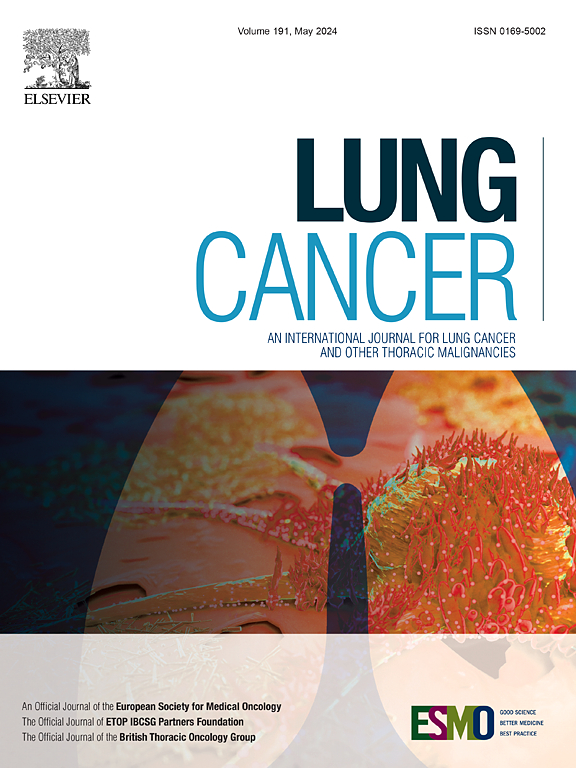Real-world safety and effectiveness of entrectinib in Japanese patients with ROS1 gene fusion-positive, unresectable, advanced/recurrent non-small cell lung cancer: Post-marketing surveillance
IF 4.5
2区 医学
Q1 ONCOLOGY
引用次数: 0
Abstract
Objectives
To evaluate the safety and effectiveness of entrectinib, an orally-administered potent multi-kinase inhibitor, for the treatment of proto-oncogene tyrosine-protein kinase-1 (ROS1) gene fusion-positive, unresectable, advanced/recurrent non-small cell lung cancer (NSCLC) in Japan.
Materials and methods
Patients with ROS1 gene fusion-positive, unresectable, advanced/recurrent NSCLC who initiated entrectinib therapy were enrolled in this all-case post marketing surveillance between February 21, 2020 and November 30, 2021. Outcomes were to identify the: (1) type and onset of initial cognitive disorder and ataxia during entrectinib therapy; (2) status of treatment and outcome of drug-related cognitive disorder and ataxia events; (3) incidence of other adverse drug reactions (ADRs) of safety concern: cognitive disorder and/or ataxia, cardiac disorder (excluding QT interval prolongation), QT interval prolongation, syncope, and interstitial lung disease; (4) incidence of serious adverse events (AEs) and ADRs; and (5) effectiveness.
Results
Of the 276 patients who initiated entrectinib, 269 and 260 were included in the safety and effectiveness analysis sets, respectively. Cognitive disorder/ataxia was the most common ADR of safety concern, occurring in 72 patients (26.8 %). The median time to onset of initial cognitive disorder/ataxia symptoms was 2.0 days. Overall, entrectinib dose reduction, interruption, or discontinuation occurred in 9.7 %, 28.3 %, and 15.2 % of patients, respectively. Most ADRs of safety concern were manageable; 86.9 % of patients with ADRs were recovered/recovering. Serious AEs were reported in 42.8 % of patients. The overall response rate (ORR) was 38.8 % and median time to treatment failure was 6.4 months. ORR was 70.8 % versus 26.8 % to 34.7 % with entrectinib as first-line versus second- or later-line treatment, and 65.3 % versus 28.2 % in patients without versus with a history of tyrosine kinase inhibitor treatment.
Conclusions
Consistent with clinical trials, entrectinib is tolerable and effective in Japanese patients with ROS1 gene fusion-positive, unresectable, advanced/recurrent NSCLC.
Study registration: UMIN Clinical Trials Registry (UMIN000046619).
求助全文
约1分钟内获得全文
求助全文
来源期刊

Lung Cancer
医学-呼吸系统
CiteScore
9.40
自引率
3.80%
发文量
407
审稿时长
25 days
期刊介绍:
Lung Cancer is an international publication covering the clinical, translational and basic science of malignancies of the lung and chest region.Original research articles, early reports, review articles, editorials and correspondence covering the prevention, epidemiology and etiology, basic biology, pathology, clinical assessment, surgery, chemotherapy, radiotherapy, combined treatment modalities, other treatment modalities and outcomes of lung cancer are welcome.
 求助内容:
求助内容: 应助结果提醒方式:
应助结果提醒方式:


